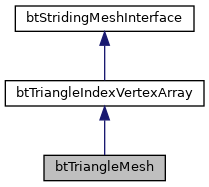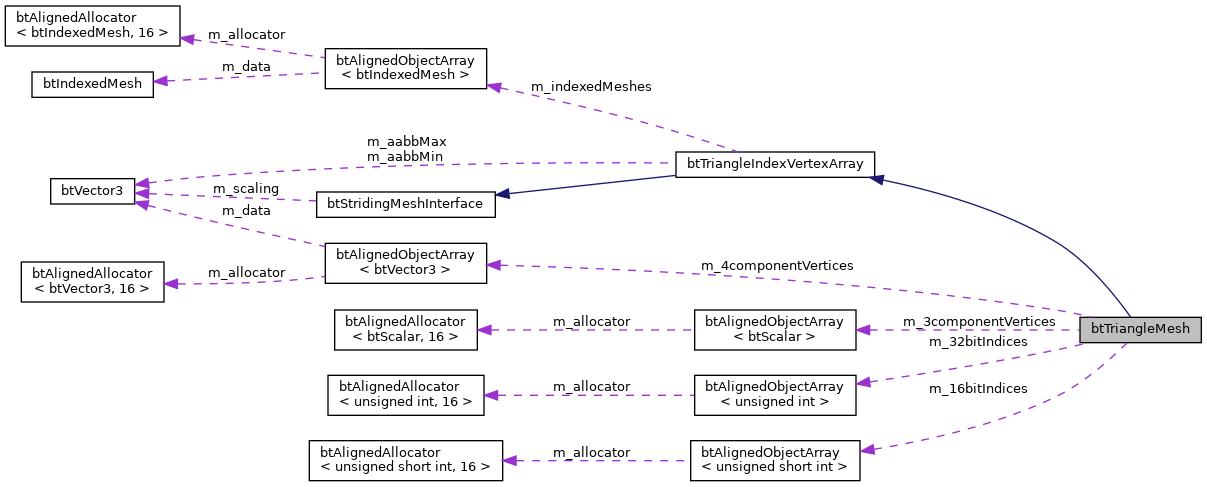|
| | btTriangleMesh (bool use32bitIndices=true, bool use4componentVertices=true) |
| |
| bool | getUse32bitIndices () const |
| |
| bool | getUse4componentVertices () const |
| |
| void | addTriangle (const btVector3 &vertex0, const btVector3 &vertex1, const btVector3 &vertex2, bool removeDuplicateVertices=false) |
| | By default addTriangle won't search for duplicate vertices, because the search is very slow for large triangle meshes. More...
|
| |
| void | addTriangleIndices (int index1, int index2, int index3) |
| | Add a triangle using its indices. Make sure the indices are pointing within the vertices array, so add the vertices first (and to be sure, avoid removal of duplicate vertices) More...
|
| |
| int | getNumTriangles () const |
| |
| virtual void | preallocateVertices (int numverts) |
| |
| virtual void | preallocateIndices (int numindices) |
| |
| int | findOrAddVertex (const btVector3 &vertex, bool removeDuplicateVertices) |
| | findOrAddVertex is an internal method, use addTriangle instead More...
|
| |
| void | addIndex (int index) |
| | addIndex is an internal method, use addTriangle instead More...
|
| |
| | BT_DECLARE_ALIGNED_ALLOCATOR () |
| |
| | btTriangleIndexVertexArray () |
| |
| virtual | ~btTriangleIndexVertexArray () |
| |
| | btTriangleIndexVertexArray (int numTriangles, int *triangleIndexBase, int triangleIndexStride, int numVertices, btScalar *vertexBase, int vertexStride) |
| |
| void | addIndexedMesh (const btIndexedMesh &mesh, PHY_ScalarType indexType=PHY_INTEGER) |
| |
| virtual void | getLockedVertexIndexBase (unsigned char **vertexbase, int &numverts, PHY_ScalarType &type, int &vertexStride, unsigned char **indexbase, int &indexstride, int &numfaces, PHY_ScalarType &indicestype, int subpart=0) |
| | get read and write access to a subpart of a triangle mesh this subpart has a continuous array of vertices and indices in this way the mesh can be handled as chunks of memory with striding very similar to OpenGL vertexarray support make a call to unLockVertexBase when the read and write access is finished More...
|
| |
| virtual void | getLockedReadOnlyVertexIndexBase (const unsigned char **vertexbase, int &numverts, PHY_ScalarType &type, int &vertexStride, const unsigned char **indexbase, int &indexstride, int &numfaces, PHY_ScalarType &indicestype, int subpart=0) const |
| |
| virtual void | unLockVertexBase (int subpart) |
| | unLockVertexBase finishes the access to a subpart of the triangle mesh make a call to unLockVertexBase when the read and write access (using getLockedVertexIndexBase) is finished More...
|
| |
| virtual void | unLockReadOnlyVertexBase (int subpart) const |
| |
| virtual int | getNumSubParts () const |
| | getNumSubParts returns the number of separate subparts each subpart has a continuous array of vertices and indices More...
|
| |
| IndexedMeshArray & | getIndexedMeshArray () |
| |
| const IndexedMeshArray & | getIndexedMeshArray () const |
| |
| virtual void | preallocateVertices (int numverts) |
| |
| virtual void | preallocateIndices (int numindices) |
| |
| virtual bool | hasPremadeAabb () const |
| |
| virtual void | setPremadeAabb (const btVector3 &aabbMin, const btVector3 &aabbMax) const |
| |
| virtual void | getPremadeAabb (btVector3 *aabbMin, btVector3 *aabbMax) const |
| |
| | BT_DECLARE_ALIGNED_ALLOCATOR () |
| |
| | btStridingMeshInterface () |
| |
| virtual | ~btStridingMeshInterface () |
| |
| virtual void | InternalProcessAllTriangles (btInternalTriangleIndexCallback *callback, const btVector3 &aabbMin, const btVector3 &aabbMax) const |
| |
| void | calculateAabbBruteForce (btVector3 &aabbMin, btVector3 &aabbMax) |
| | brute force method to calculate aabb More...
|
| |
| virtual void | getLockedVertexIndexBase (unsigned char **vertexbase, int &numverts, PHY_ScalarType &type, int &stride, unsigned char **indexbase, int &indexstride, int &numfaces, PHY_ScalarType &indicestype, int subpart=0)=0 |
| | get read and write access to a subpart of a triangle mesh this subpart has a continuous array of vertices and indices in this way the mesh can be handled as chunks of memory with striding very similar to OpenGL vertexarray support make a call to unLockVertexBase when the read and write access is finished More...
|
| |
| virtual void | getLockedReadOnlyVertexIndexBase (const unsigned char **vertexbase, int &numverts, PHY_ScalarType &type, int &stride, const unsigned char **indexbase, int &indexstride, int &numfaces, PHY_ScalarType &indicestype, int subpart=0) const =0 |
| |
| virtual void | unLockVertexBase (int subpart)=0 |
| | unLockVertexBase finishes the access to a subpart of the triangle mesh make a call to unLockVertexBase when the read and write access (using getLockedVertexIndexBase) is finished More...
|
| |
| virtual void | unLockReadOnlyVertexBase (int subpart) const =0 |
| |
| virtual int | getNumSubParts () const =0 |
| | getNumSubParts returns the number of separate subparts each subpart has a continuous array of vertices and indices More...
|
| |
| virtual void | preallocateVertices (int numverts)=0 |
| |
| virtual void | preallocateIndices (int numindices)=0 |
| |
| virtual bool | hasPremadeAabb () const |
| |
| virtual void | setPremadeAabb (const btVector3 &aabbMin, const btVector3 &aabbMax) const |
| |
| virtual void | getPremadeAabb (btVector3 *aabbMin, btVector3 *aabbMax) const |
| |
| const btVector3 & | getScaling () const |
| |
| void | setScaling (const btVector3 &scaling) |
| |
| virtual int | calculateSerializeBufferSize () const |
| |
| virtual const char * | serialize (void *dataBuffer, btSerializer *serializer) const |
| | fills the dataBuffer and returns the struct name (and 0 on failure) More...
|
| |


 Public Member Functions inherited from btTriangleIndexVertexArray
Public Member Functions inherited from btTriangleIndexVertexArray Public Member Functions inherited from btStridingMeshInterface
Public Member Functions inherited from btStridingMeshInterface Protected Attributes inherited from btTriangleIndexVertexArray
Protected Attributes inherited from btTriangleIndexVertexArray Protected Attributes inherited from btStridingMeshInterface
Protected Attributes inherited from btStridingMeshInterface